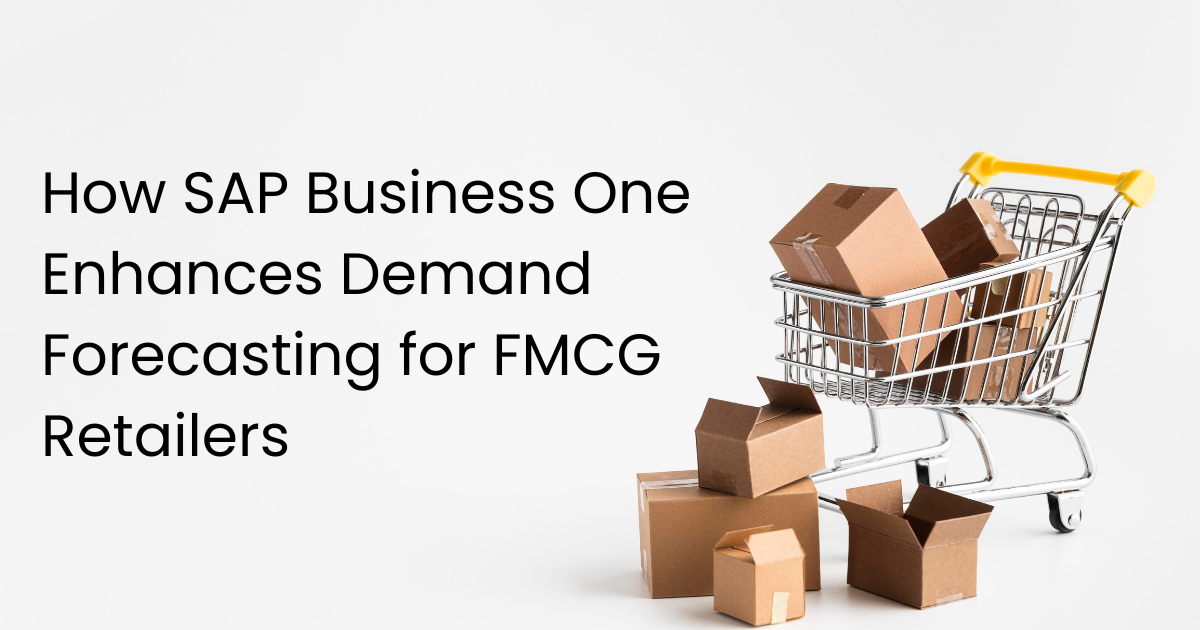
How SAP Business One Enhances Demand Forecasting for FMCG Retailers
The Fast-Moving Consumer Goods (FMCG) industry, which produces daily consumer products, has significant growth potential. SAP Business One is software that integrates with various mobile components, ensuring smooth operations and steady product flow. Its functions simplify daily setup and department monitoring, resulting in efficient output and smoother overall business operation.
The guide here explores SAP Business One's advanced forecasting techniques and their impact on demand planning focusing on the FMCG businesses. It discusses key features and tools, best practices, and how companies can use these capabilities to improve forecasting results.
SAP Business One in the FMCG Industry
SAP Business One ERP solution designed to help businesses in the Fast-Moving Consumer Goods (FMCG) market manage inventories, ensure timely deliveries, and adapt to changing consumer demands, enhancing efficiency, speed, and accuracy in the sector.
As a comprehensive system, SAP B1 integrates procurement, inventory management, and sales, providing real-time visibility and control. It also enhances supply chain management through robust tools like demand forecasting and supplier management, thereby optimizing supply chains and reducing lead times.
Key Takeaways of SAP Business One for FMCG Retailers
SAP Business One software integrates business processes, enhancing operations, supply chain management, and CRM in the FMCG sector, providing a strategic advantage for businesses to optimize efficiency. Here is how SAP B1 stands as a reliable solution for FMCG retailers.
1. Financial Planning and Management:
SAP Business One works as a finance management software designed for small and medium-sized enterprises (SMEs). It streamlines invoice processing, simplifies accounting, and offers transparency in department cash flow. This helps businesses plan, understand market trends, and make strategic decisions like cost-cutting and new outlets.
The software protects all concerns related to managing finances, ensuring business owners are better equipped to expand into different markets. Overall, SAP Business One simplifies finance management for businesses.
2. Managing the Supply Chain Management:
SAP Business One streamlines the supply chain for FMCG companies by enabling easy tracking and management of materials across multiple warehouses. Its bar code scanning feature aids in understanding product inflow and outflow, reducing costs and making product tracking more efficient.
3. Customer Management:
For a b2c business model, the customer stands as a focal point. SAP Business One offers dedicated segments to address consumer concerns and allows for data storage based on purchases, quantity, time, and frequency. It also allows for the attachment of documents and personnel notes to customer profiles, providing a comprehensive view of each customer's journey with the brand.
4. Delivery and Schedule-Related Operations:
SAP Business One simplifies order management by providing customizable options to set up the delivery life cycle of products based on business needs. This helps businesses even during peak seasons by easily tracking and pipelining orders for shipping and delivery according to predetermined time schedules.
5. Production and Sales Targets:
SAP Business One helps businesses manage their products by forecasting trends and managing shelf life. It provides real-time information on customer needs, ensuring only good products are sold. The system also sends notifications when products need to be cleared if they aren't sold within a certain time limit. SAP Business One reduces wait times for generating reports and offers an in-built analytics system for clear sales reports.

How Is Demand Forecasting Beneficial for FMCG Retailers?
SAP B1 demand forecasting stands as a powerful tool for FMCG retailers, offering demand forecasting capabilities that are crucial for optimizing inventory levels and minimizing waste. The tool uses historical sales data, seasonal trends, and external factors to generate reliable predictions of future demand. It allows for granular forecasting at the SKU level, considering product-specific factors like promotions, price changes, and market trends.
For FMCG retailers managing multiple stores or distribution centers, location-specific forecasting accounts for regional variations in demand, enabling more efficient supply chain management and inventory distribution. The system also forecasts revenue, helping retailers make informed decisions about pricing strategies and promotional activities.
Conclusion:
SAP Business One offers advanced forecasting techniques that can significantly improve demand planning processes, leading to improved accuracy and operational efficiency.
With SAP B1 in FMCG, retailers enhance business transformation with financial and supply chain management. Digital transformation of supply chains can provide visibility and efficiency in today's competitive business climate.
Kundesupport af UserEcho
